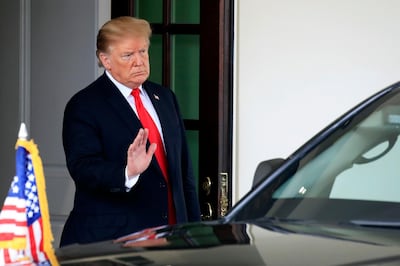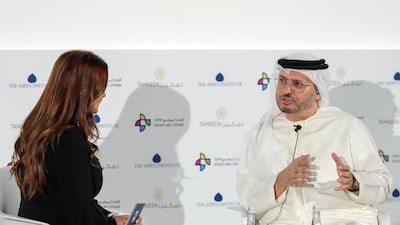An increasingly fragmented global order and the prospect of America retreating from the world stage is “worrying” the UAE, a senior minister has said.
Anwar Gargash, speaking at Ideas Abu Dhabi, told his audience the country wanted to see more cross-border unity but is looking on with concern at divisions in Europe and the possibility of more confrontations between the United States and China.
He spoke after Gordon Brown, the former UK leader whose country is currently in crisis over Brexit, and Matteo Renzi, the former Italian Prime Minister who lost power as the anti-establishment Five Star Movement rose to prominence, expressed their own fears at the consequences of a rise in populism.
Dr Gargash, Minister of State for Foreign Affairs, described the global situation as “very fluid” and “very worrying”, and that more competition between nations was a challenge for the Emirates.
“I was on a recent trip to Washington, then I was on another trip to Europe, and what I really saw was there is an introspection,” he said. “In America, there clearly is huge inner dialogue about America’s place in the world, most acutely about America’s place in the Middle East.”

The situation has left the UAE questioning if the current US approach is caused by a “normal cyclical battle” or whether a major ally had changed for good.
“This is very worrying for a country that has always seen America's role in the region as a positive,” he said. “In Europe, clearly the optimism of the European project - that this is a linear projection of European integration - is no longer the view.
“I share a lot of the views we have heard with regards to China. I am very concerned about this new great power confrontation that could be looming and is being seen as a strategy, because clearly from our perspective, the more co-operation there is between the US, Europe and China, the better it is also for us. The more agreement we have, the more co-operation we have in the international order, the better it is for us.”
Political Islam
He said it was important that the wider Middle East region moved away from “political Islam” as a system of government, which he said had been a “total failure”.
“If you look at political Islamists, they took over Egypt,” he said. “If you look at their literature they have hundreds of books on segregation between men and women.
"And they have very, very little on running a modern economy.”
Significantly, he also spoke openly about his hopes for finding a resolution to the Arab-Israeli conflict. He called for a “more stable regional system” that would allow Middle East nations to resolve problems such as the Israel-Palestine conflict, the Yemen civil war or Syria crisis between themselves.
The need for a more reliable Arab regional order is seen as particularly pressing with the international situation in flux.
In conversation with The National, on day one of the two-day festival, he said the decision of many Arab countries not to talk with Israel had complicated finding a solution over the decades.
“Many, many years ago, when there was an Arab decision not to have contact with Israel, that was a very, very wrong decision, looking back,” he said. “Because clearly, you have to really dissect and divide between having a political issue and keeping your lines of communication open.”
He predicted increased contact between Arab countries and Israel, such as small bilateral deals and visits by politicians and sports players, in the years ahead. But he also forecast a deeper “strategic shift” in relations.
Relations with Israel
“The strategic shift, needs actually, for us to progress on the peace front,” he said. “What we are facing, if we continue on the current trajectory, I think the conversation in 15 years’ time will really be about equal rights in one state.
“I know that this conversation is there right now but it’s on the margins. But this conversation will shift because a two-state solution will no longer be feasible because a sort of reduced rump state will no longer be practical.
“From the perspective of the UAE, we do need to resolve it, because this issue has this tendency of jumping out of the background when it’s quiet to suddenly becoming headline news.
But the current trajectory we are seeing, I think 10 to 15 years, the discussion will be what is the nature of the Israeli state, what are the rights of the Palestinians within that Israeli state, should they be equal citizens, is it sustainable that they are not equal citizens?”
He also admitted changing global dynamics had created “conundrums” for the UAE, not least when deciding what to do about Yemen.
“And for countries like us we are in a conundrum,” he said. “Because the rules of the game are changing but the rules are not out yet.
“So suddenly, we have a challenge such as Yemen, for example. What do we do here?
“Do we sort of secure our own regional interests, stability, or do we allow an emergence of another Hezbollah scenario, as we saw in 1983.
“So, these are two tough choices, we made the first choice, and then we notice that our strategic narrative has been lost to a more humanitarian narrative, in many ways rightly so.
“So these are all issues of a region where the international order is in flux and the region itself is supposed to adjust but doesn’t have really the tools to adjust.”

